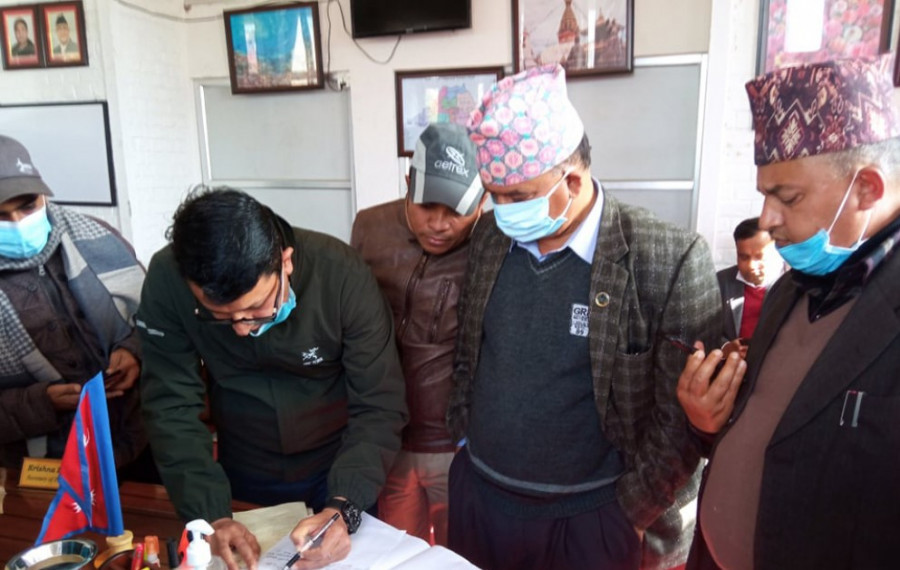Politics
Congress in driver’s seat as power play begins in provinces
Both factions of Nepal Communist Party need backing of opposition party to further their cause in the provinces.
Tika R Pradhan
A vertical split in the Nepal Communist Party triggered by Prime Minister KP Sharma Oli’s move to dissolve the House of Representatives has now put the spotlight on the main opposition, the Nepali Congress.
Both factions of the ruling Nepal Communist Party now need the support of the party, which suffered a massive drubbing at the hands of the Left Alliance during the parliamentary, provincial, and local elections.
Although the Grand Old Party, which has been hitting the streets against the dissolution of Parliament, has been non-committal, members of the Oli faction are confident the party will support the prime minister’s faction of the ruling party.
“During our meeting with the prime minister a week ago, he told us that an agreement has been reached with Nepali Congress President Sher Bahadur Deuba to save provincial governments being run by Oli’s allies,” said Sita Poudel, a leader of All Nepal Women’s Association, considered a close Oli ally. “If the prime minister hadn’t reached such an agreement with Deuba, the Nepali Congress would have held massive street protests,” she added.
No-confidence motions have so far been registered against chief ministers of two provinces while various parties are attempting to forge an alliance to topple the government in two other provinces.
Bagmati Province was the first to witness the ripple effects of the party’s split as 45 members of the provincial assembly registered a no-confidence motion against Chief Minister Dormani Poudel, a close ally of the prime minister, on December 25. The second casualty was Chief Minister of Province 1 Sherdhan Rai, against whom 37 assembly members registered a no-confidence motion on December 27.
Now with both the provincial assemblies preparing for their winter session to start on January 20, both factions of the ruling party have been busy trying to garner support for their cause.
“I think discussions on the no-confidence motion will begin after a week when the winter session of the provincial assemblies in Province 1 and Bagmati begin,” said Shalikram Jammarkattel, former minister of Bagmati Province who filed the no-confidence motion against Chief Minister Dormani Paudel. “We are trying to forge new alliances both at the provincial and central level, but an alliance hasn’t taken its full shape.”
Meanwhile, in Lumbini, Chief Minister Shankar Pokhrel’s government will be reduced to a minority status after assembly members from the Dahal-Nepal faction withdraw their support to the government. Pokhrel claims he has the backing of 41 members in the 87-strong provincial assembly.
To topple Pokhrel’s government, all parties represented in the assembly need to forge an alliance. The Dahal-Nepal faction holds 20 seats in the assembly, the Nepali Congress 19, Janata Samajbadi Party 6, and Rashtriya Janamorcha 1.
The situation is similar in Gandaki with Chief Minister Prithvi Subba Gurung getting the backing of 27 of the 60 assembly members. The Dahal-Nepal faction has 13 seats, the Nepali Congress has 15, Rashtriya Janamorcha has 3 and Janata Samajbadi has 2. An alliance encompassing all parties, except for the Oli faction, can only topple Gurung’s government.
However, there are fears that Prime Minister Oli might get fed up with the equations in the provinces and decide to dissolve all the assemblies and announce fresh elections at the provincial level as well. The prime minister, and ministers Shiva Maya Tumbahangphe and Lekhraj Bhatta have already hinted that the provincial assemblies could be dissolved if opponents try to topple governments in the provinces.
“As Oli accepted federalism only after he was dragged into it, he does not have the feeling of ownership of the system,” said Rajendra Maharjan, a political analyst. “So it won’t be wise to provoke such a person who does not follow the constitution,” he added.




 13.12°C Kathmandu
13.12°C Kathmandu














